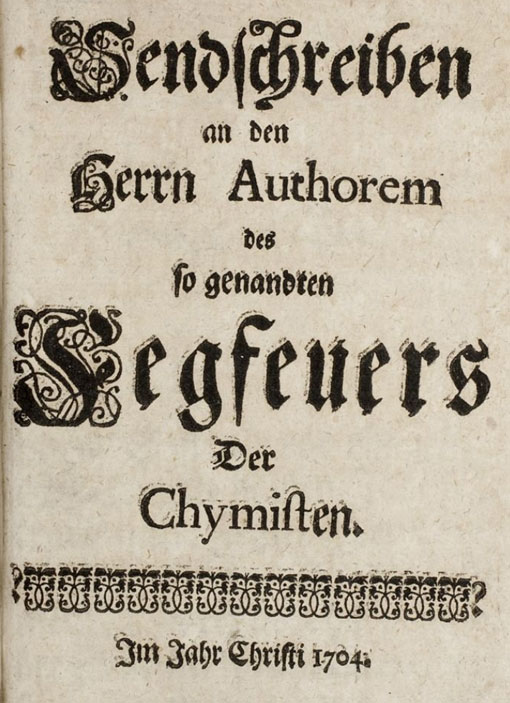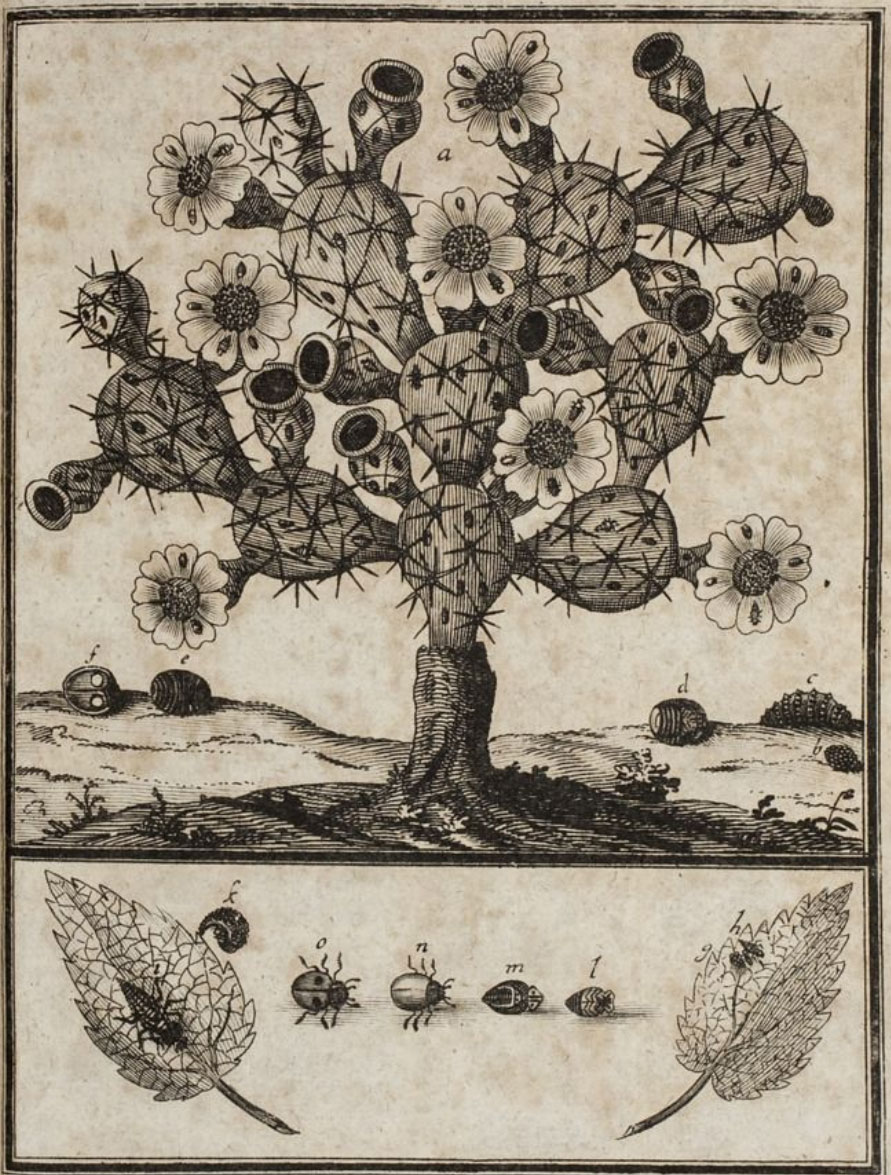Letter to the gentleman Author of the so-called Beacon-Fire of the Chymists or Purgatory of the Chymists
Buy me CoffeeLetter
to the gentleman Author
of the so-called “Beacon-Fire of the Chymists” or “Purgatory of the Chymists”
In the year of Christ 1704.
Johann Anton Söldner's "Purgatory of the Chymists" was published in Amsterdam in 1702 [or already in 1701?].
Author is named in the original Fingerprint after copies from the Hamburg and Göttingen State and University Library
Translated from the book called:
Sendschreiben an den Herrn Authorem des so genandten Fegfeuers Der Chymisten

( S. T. )
Highly esteemed Sir,
It is now about half a year since your little treatise, called “Beacon-Fire of the Chymists,” came into my hands; only recently, however, have I obtained the other writing which an adversary has brought out against it, come under my eyes.
Yet I heartily regret that the chymical truth is not set forth and defended with greater meekness of spirit and true humility of heart. For this Hermetic philosophy has a very close kinship and harmony with true theology, so that by it the greatest mysteries of the faith can be recognized under the clearest and most visible parables, and as it were be seen in a mirror.
Especially it has distressed me that the latter author, who (as I have been informed) is supposed to be a theologian, has broken out with so very many harsh expressions, in no way becoming to a Christian; and although at the end he indeed wishes to make it good again, yet such scolding as he has carried on is entirely contrary to the meek spirit of Jesus Christ. For this reason, because of the many offensive and scandalous words that occur in the aforesaid refutation of the Beacon-Fire, I have not been able to read it right through.
But as for the most highly esteemed little treatise itself is concerned, it has pleased me well on account of some good historical information given in it (which the aforementioned adversary himself has also praised); so that I also wish that he may continue in such things and further serve the sons of the Art with his talent.
Only I further wish that God would grant him the grace to renew him wholly through His Holy Spirit, so that in future he may also leave out all jesting and abusive words in serious matters, various passages of his little treatise, indeed quite easily from the title-page itself, make it clear, and it is sufficiently evident to anyone who walks in the light of God, that up to now nature, or his natural temperament, still has a considerable upper hand in him over the grace of God.
And although I do not know him, and do not know where he is or where he dwells, yet from the manifest data of his writing I could very easily determine his temperament and clearly prove that what I have here set down is well grounded and built on an unimpeachable foundation.
I also see well enough that he may have so upright a disposition that he is not incapable of coming to a knowledge of himself. But whether he, or likewise his opponent, is a true Adept, you will know best. If they are not, I should like to know how they can judge thoroughly of the writings of those Adepti and be able to make a proper distinction between them and all sophists. But if one or the other of them is a true Adept, then you see that their knowledge serves them far more as a snare and for their ruin than for true blessedness.
For although I certainly cannot put myself forward as an Adept, yet I see quite clearly from the history of the philosophers, the Adepts, and could also sufficiently show from those examples that are to be found in the Purgatory of the Chymists, that there are two quite different kinds of Adepti, namely those who such as either obtain it only from the lumen naturae (light of nature), or else those who receive it from the lumen gratiae (light of grace), whether this happens mediately or immediately.
Those who obtain it only from the light of nature (which is indeed quite possible, although the Stone is the highest thing in nature) — since it is nevertheless something outside or above the powers of nature — these are therefore marked out for it by the astral spirit and endowed with uncommon natural gifts, and are not worthy of this splendid Arcanum and great marvel of Nature, nor fit for the end for which the great and wise Creator has ordained and appointed it; namely, that one should thereby all the more recognize the wisdom and goodness of God, and with an upright heart rightly glorify and praise Him, and with it come to the aid of one’s poor neighbour – but instead they much rather abuse it for their own advantage, for the lust of the flesh, the lust of the eyes, or a proud life.
Most of these have miserably lost their lives and have come to a fearful end. Those, however, who have obtained it from the lumen gratiae (light of grace) and those who use it worthily, them the LORD has also preserved in his grace and has kept them from every misfortune of body and soul.
They should therefore, dear highly honoured gentlemen, examine of what spirit’s children they are: whether the spirit of this world still has its business and dominion in them, or whether it is the Spirit of the grace of Jesus Christ. And wherever the former is still found in them—as they will readily discover when they rightly know themselves learn, and not think of themselves more highly than they ought, but turn to God in sincere repentance, and above all first of all persist longingly, earnestly, and steadfastly in seeking a new birth; otherwise all their knowledge is folly before God. And even if they themselves had the Stone (which, however, may still well be doubted), it would, as stated above, serve them more for harm than for profit.
Yet from my heart I wish that the grace of Jesus Christ may be richly upon them, and that also the true wisdom and science of chymia of the Adepti may grow more and more, and finally become known to many devout reborn ones to the praise of the great Jehovah. To His eternal love I herewith commend him and take my leave.
To my highly honoured Sir,
in haste
Frankfurt, the 20th of March 1704.
Your loving and willing servant,
J. V. Reich, M.D. and L.Ph.,
at Solms-Laubach.

Explanation of the copperplate
a. The plant or growth on which the cochineal-worms are reared, as it can be seen depicted in Peter Pomet’s upright merchant.
b. The little eggs which, when the cochineal grains have been treated as mentioned in chapter III, lie close together in them.
c. The caterpillar or cochineal-worm before it has yet begun its transformation.
d. The cochineal grain seen from below.
e. The same seen from above.
f. The little cochineal beetle.
g. The yellowish little eggs of our “Gottes-Fühlein” on a leaf of the greater nettle.
h. The little worms which have hatched out in the room.
i. The grey and yellow worm in its proper size, when it is preparing for its transformation.
k. How it has fastened itself firmly by the hind part to a leaf.
l. The little pupa which has come from this worm, as seen from above, and
m. as seen from below.
n. The beetle which has only just emerged.
o. The fully developed “Gottes-Fühlein”, with the black little spots on its wings.